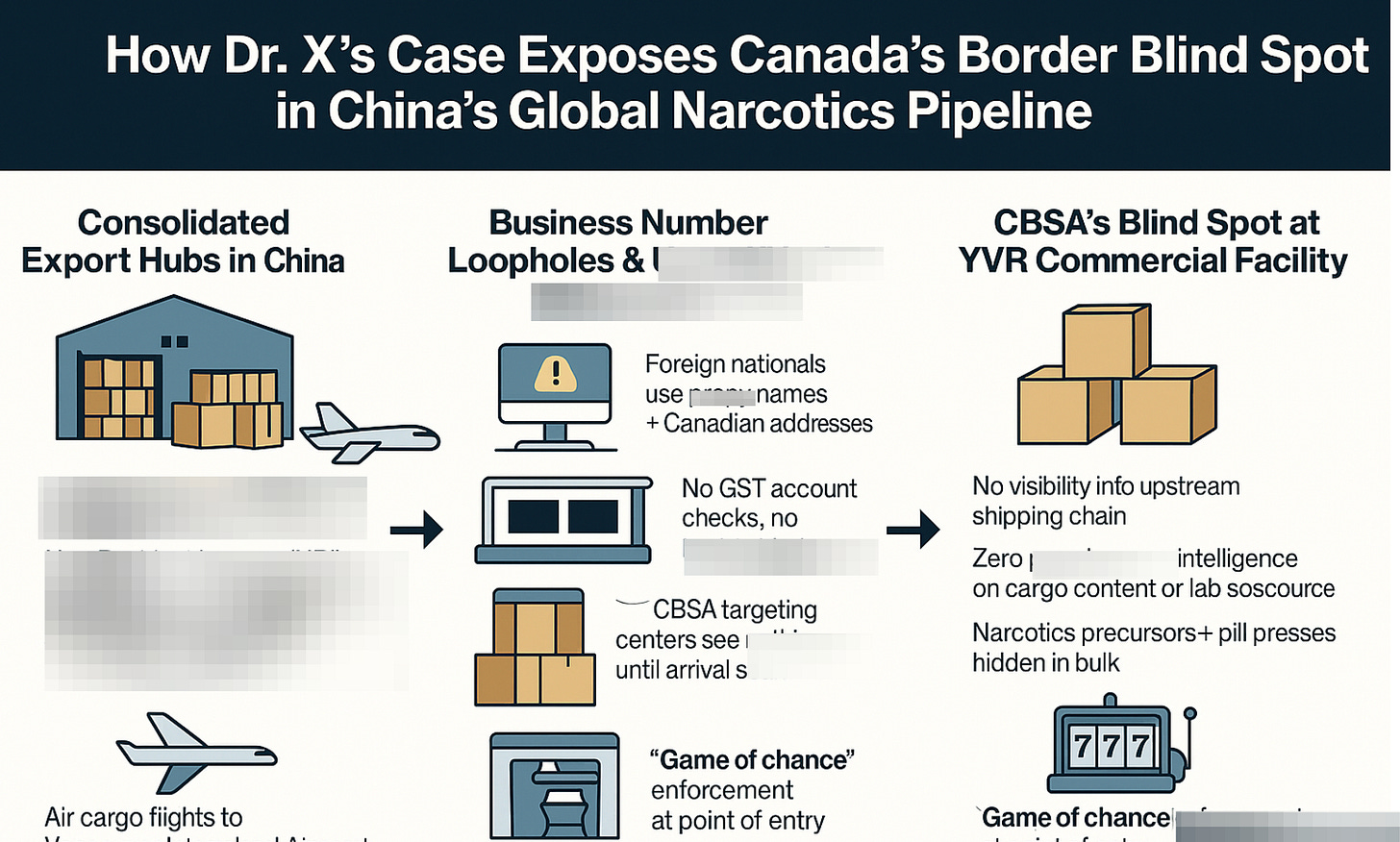EXCLUSIVE: Charges Dropped Against Chinese Scientist in Vancouver Tied to Xi’s “Talents” Program and Canada’s Synthetic Drug Pipeline
The Bureau uncovers how a CCP-linked academic hired under China’s “Talents” plan evaded prosecution after allegedly being caught with precursors shipped from PRC
VANCOUVER — Canadian prosecutors have quietly dropped charges against a Chinese scientist in Vancouver accused of importing more than 100 kilograms of a narcotics precursor, raising serious questions about her connections to Chinese academic programs and networks suspected of links to espionage, foreign interference, and transnational crime, The Bureau has learned.
The 57-year-old chemist, referred to here as Dr. X due to the unusual termination of the case, has documented affiliations with Chinese institutions flagged for military research and intelligence collaboration. According to filings from a bio-pharmaceutical company with ties to the University of British Columbia that hired her to lead large-scale cannabinoid extraction, Dr. X was reportedly working within Canadian universities under Beijing’s “Talents” plan—a recruitment initiative expanded under President Xi Jinping and described by U.S. intelligence as a platform for espionage and dual-use technology transfer.
British Columbia court records confirm that Dr. X, a graduate of Zhejiang University—an institution associated with China’s Ministry of State Security—was charged in June 2022 with importing and exporting a controlled substance.
Sources familiar with the court file informed The Bureau that Dr. X was accused of importing over 100 kilograms of PMK ethyl glycidate, a synthetic chemical widely used in the production of MDMA (ecstasy). Dr. X was allegedly caught retrieving the shipment in Richmond, British Columbia.
The Bureau’s investigation into her international academic, corporate, and legal affiliations reveals links to suspects, residences, and shipping hubs in Vancouver associated with the Sam Gor syndicate—a sprawling transnational drug cartel including triad leaders based in Vancouver and Toronto, with documented ties to Chinese Communist Party–aligned foreign influence networks operating across North America.
Despite the gravity of the charges and over ten court appearances for Dr. X within three years, the Public Prosecution Service of Canada issued a stay of proceedings on March 31, 2025, quietly shelving the unreported case without public explanation.
“The Crown has an ongoing obligation to assess its cases to ensure they continue to meet the standard for prosecution,” a spokesperson for the prosecution service in Ottawa told The Bureau. “In this case, the Crown determined that the standard was no longer met and, in accordance with Section 579 of the Criminal Code, directed a stay of proceedings.”
The timing of the decision is troubling.
This year U.S. authorities have increasingly identified Vancouver as a global hub for precursor chemical smuggling and lab production for synthetic narcotics—including fentanyl, MDMA, and methamphetamine. The opaque dismissal of such a serious case raises urgent public interest concerns about legal failures, political reluctance, and Canada’s lack of enforcement tools to dismantle foreign-linked criminal networks operating across the nation with near-total impunity.
In a parallel case that sources say is linked to a major superlab investigation in British Columbia, stemming from U.S. DEA probes, the U.S. Department of the Treasury’s Office of Foreign Assets Control in October 2023 sanctioned Vancouver-based businessman Bahman Djebelibak and his companies—Valerian Labs Inc. and Valerian Labs Distribution Corp.—for their alleged role in a China-based network trafficking precursors for fentanyl, methamphetamine, and MDMA.
According to Treasury, the Port Coquitlam firms were major clients of Jinhu Minsheng Pharmaceutical Machinery, a Chinese supplier of pill presses and dies used to manufacture counterfeit oxycodone tablets. Valerian Labs allegedly received shipments of methylamine hydrochloride, a chemical precursor for meth and MDMA.
Djebelibak has denied the allegations, stating that his companies legally produced health supplements under Health Canada licences.
The Bureau’s deeper investigation into Dr. X’s career reveals a complex web of institutional and corporate ties—spanning academic programs and research partnerships with universities in Ontario, Sweden, and the University of British Columbia, as well as a cluster of bio-pharma ventures in Vancouver, Oregon, and Suzhou, China.
Some of the most concerning connections emerge from a detailed review of filings from a now-delisted Canadian cannabinoid extraction company—referred to here as Company A. Once licensed by Health Canada, the firm was suspended from trading on Canadian stock exchanges amid a $50-million investment fraud scandal involving a Chinese family from West Vancouver, accused of operating illegal cannabis dispensaries in British Columbia and Ontario, with reported ties to organized crime.
A 2016 corporate filing shows that Company A appointed Dr. X as Director of Science and Technology, citing her portfolio of more than 20 patents and her work assisting manufacturers worldwide with securing financing, project evaluation, equipment procurement, and the design and construction of extraction facilities. The same filing disclosed that Dr. X was “currently appointed as overseas talent for the Chinese government” and identified her as an expert consultant for the Zhejiang University Innovation Research Institute.
Zhejiang University is designated high-risk in the Australian Strategic Policy Institute’s Defence Universities Tracker, due to its links to military laboratories, cyber-espionage programs, and China’s defense industrial base. A 2012 U.S. Congressional report identified the university as a recipient of research funding from the Ministry of State Security (MSS), China’s sprawling civilian intelligence agency. The MSS is now widely described as the world’s most aggressive and expansive foreign interference entity, with an estimated hundreds of thousands of officers and affiliated operatives.
In 2013, U.S. officials arrested cancer researcher Huajun Zhao for attempting to send proprietary biomedical materials from the Medical College of Wisconsin to Zhejiang University—an alleged act of espionage.
Notably, Dr. X’s patent portfolio spans a broad range of technologies, including chemical extraction and separation for cannabinoid pill and vape applications, novel cancer research, and electroluminescent devices used in display technologies.
By 2017, Dr. X’s Vancouver-based Company A had partnered with a biotech and pharmaceutical firm in Suzhou, China, importing proprietary machinery and processing technology to its Vancouver facility. Internal documents outlined plans to process 50,000 kilograms of hemp biomass per day, with a 600-ton extraction plant under construction to produce 150 tons of purified CBD isolate annually for export to Europe, Asia, and Australia.
In an investor briefing that same year, Dr. X described the Suzhou equipment as “the only extraction technology capable of processing industrial-scale volumes” of hemp, capable of isolating its compounds to achieve high purity levels.
Also in that briefing, a clinical researcher and assistant professor from the University of British Columbia who had joined Company A’s board, stated: “We are eager to bring this technology to [Company A’s] lab to verify its capabilities.”
In 2018, Dr. X co-founded a nearly identical company outside Portland, Oregon, operating a hemp extraction facility licensed by the Oregon Department of Agriculture. The company, reportedly processing 1,000 kilograms of hemp biomass daily, is listed as a subsidiary of a Chinese biotechnology firm directed by Chinese nationals—raising further questions about cross-border chemical flows and Dr. X’s ongoing ties to Chinese pharmaceutical supply chains.
Further review of Company A’s board and Canadian court filings reveals that one director was a key business associate of a Richmond-based lawyer implicated in the RCMP’s largest-ever money laundering investigation, Project E-Pirate. That probe uncovered a vast underground banking network tied to the Sam Gor syndicate, which allegedly moved hundreds of millions—if not several billion—in drug proceeds through British Columbia government casinos, hundreds of Chinese bank accounts, and interconnected cash pools stretching across diaspora communities in Canada and Latin America.
Canada's Border Blind Spot
The Bureau’s investigation into Dr. X’s case and related networks in British Columbia reveals a sweeping failure in Canada’s border controls and financial oversight of chemical precursor imports—an unchecked vulnerability that has drawn no acknowledgment or scrutiny from Prime Minister Mark Carney’s government, even as President Donald Trump threatens staggering trade tariffs and presses Ottawa to confront its role in the global fentanyl trade.




